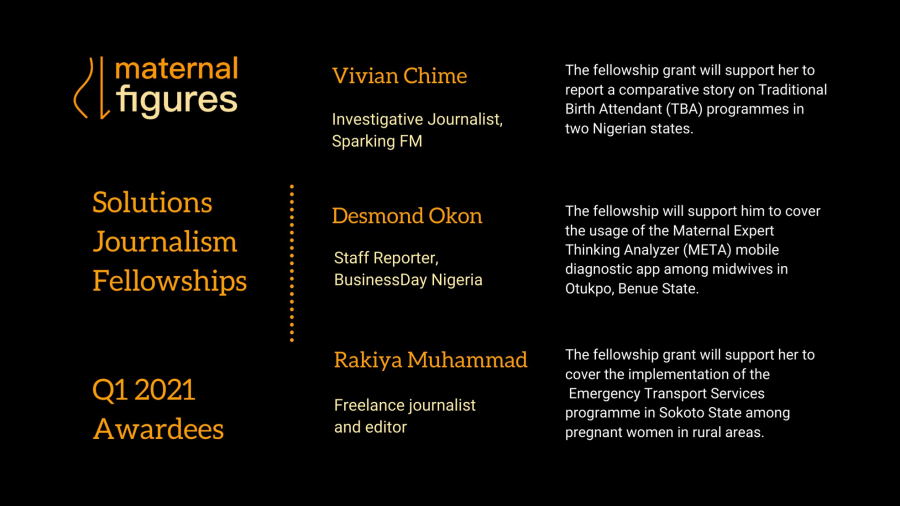Ambulance services in Sokoto, a mobile app for midwives in Benue, and how Cross River can support traditional birth attendants.
The most challenging aspect of building the Maternal Figures database was finding information about maternal health interventions implemented in Nigeria over the last three decades. Government-funded programs were often abandoned between administrations, some donors didn’t make progress reports available, and there is no existing resource about maternal health related policy. Through the Maternal Figures Solutions Journalism Fellowship funded by the Brown Institute for Media Innovation and Code For Africa, we support journalists to produce in-depth reporting on maternal health in the country, while updating the database with new information found through their reporting.
For example, in Sokoto, Rakiya Muhammad explored for RM Times how a government funded ambulance service has helped reduce maternal deaths in rural communities by over 80%. According to Muhammad’s reporting, we learned that there are about 300 ambulances to service the state’s 244 wards. And, so far, they have provided a reprieve for pregnant women who in the past were ferried to the hospitals by donkeys or on the backs of their loved ones. Despite the success of the program, drivers at the wheel of the ambulances have complained of low wages and some of the vehicles are unable to reach some remote communities because of security issues or bad road conditions.
After the database launched in 2020, Rakiya reached out to the Maternal Figures team to see if we had details about this ambulance program. At the time, we didn’t. After continued conversation and a successful fellowship application, we were able to support Rakiya’s investigation into the program through our fellowship and we have gone ahead to include it in our database.
For Business Day Nigeria, Desmond Okon looked at the Maternal Expert Thinking Analyzer (META), an app supported by the Canadian Network for International Surgery (CNIS) and Grand Challenges Canada. Using the Community Maternal Danger Score (CMDS), midwives are able to track vital signs for pregnant women, assess mortality risks using information imputed in the app, and send patient-specific text messages to women to alert them of any risks. The app has proven successful in the state, but its users have complained of limited internet connectivity.
Desmond found the app in our database and his reporting has provided more context about the successes and shortcomings of the app. While the app allows midwives in Benue state to function as experts in remote locations where access to medical doctors is limited, they are sometimes unable to reach women they are tasked with caring for because many of them do not own phones. With the information unearthed through Desmond’s reporting, we were able to update our database to reflect the impact of META.
In Cross River state, one lawmaker called for a ban on traditional birth attendants as a way to protect women from maternal deaths, Vivian Chime reported on how southwestern states like Ondo and Lagos have implemented policy to train and adapt traditional birth attendants into the healthcare system instead of criminalizing them.
Vivian reported the story for the Union Nigeria and a radio version aired on Cross River’s Sparkling FM 92.3. Her reporting provided a rejoinder to the lawmaker’s assertions and looked at how existing interventions like Ondo State’s Agbebiye and the Lagos State Traditional Medicine Board can be replicated in her own state.
The reporting grants provide an opportunity for journalists to produce stories that they would not have had the time or financial resources to pursue on their own, and we are proud to offer that support. In addition, the fellowship helps us by providing contextual information about interventions that have been hard to find details on.
In the months since we launched the database, we have seen through our analytics that the channel most new users access our platform through (38.2%) has been Organic Search via Google. Many of these search entries have been interventions announced over the years using terms like “what is happening in Kano + intervention name.” We see Maternal Figures as filling a gap left by a longstanding lack of accountability in Nigeria, especially when it comes to maternal health.
The strong reporting produced by Maternal Figures fellows are an extension of our database, enabling us to continue updating the information we provide and aiding journalists to produce impactful journalism.
Learn more and explore the Maternal Figures database at maternalfigures.com.

